Entertainment
‚ÄėThe Hunger Games: The Ballad of Songbirds and Snakes‚Äô review: This return to Panem was well worth the wait
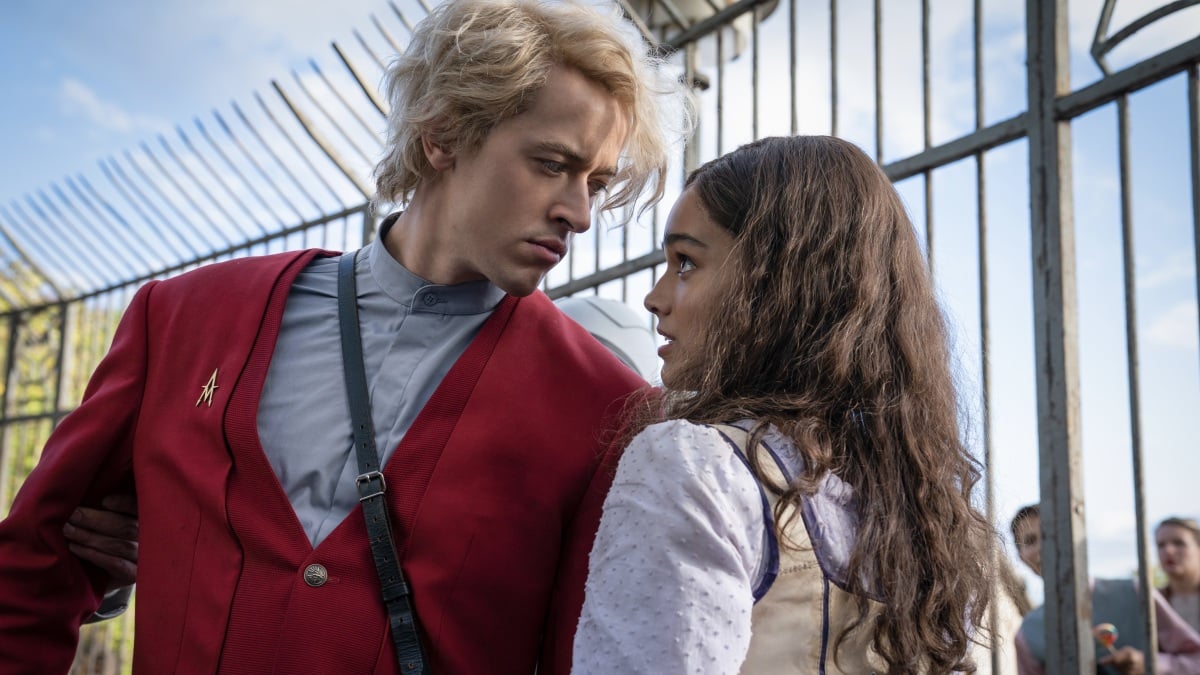
It’s strange to say that a movie about child death-matches makes me deeply nostalgic, but then again, that’s the power of The Hunger Games.
Based on the greatest-selling novels by Suzanne Collins, these films were pop culture juggernauts, the perfect distillation of the dystopian YA boom of the 2010s (which I and countless others devoured). They launched their stars to global fame, prompted heated debates over the Katniss-Peeta-Gale love triangle, and spawned several attempts to jumpstart the Next Big Dystopian Franchise. Think The Maze Runner, Divergent, or the very ill-conceived revamp of The Giver.
‚ÄėThe Hunger Games: The Ballad of Songbirds and Snakes‚Äô trailer takes us back to the arena
But amid the glitz of the Capitol and the buzzworthy romance, The Hunger Games also introduced young audiences to onscreen depictions of authoritarian governments and state propaganda. These depictions have only gotten more resonant as audiences have aged. Earlier in 2023, the series experienced a resurgence on TikTok, with grown-up fans reevaluating their relationship to The Hunger Games in the context of what Mashable reporter Elena Cavender termed ‚Äúour modern dystopia.‚ÄĚ That messaging has always been present in the franchise, along with the edge-of-your-seat excitement that comes from the Games‚Äô pageantry and life-and-death stakes. But like with any books or films, our recognition of and relationship to said messaging changes over time.
The new Hunger Games prequel, The Ballad of Songbirds and Snakes, recognizes the inevitability of this change in the franchise’s fans. So, while it takes us back to an earlier period in Panem’s history, it by no means lets up on these mature themes. Instead, it doubles down, dissecting the human struggle between good and evil through the lens of a very different kind of Hunger Games.
What is The Hunger Games: The Ballad of Songbirds and Snakes about?
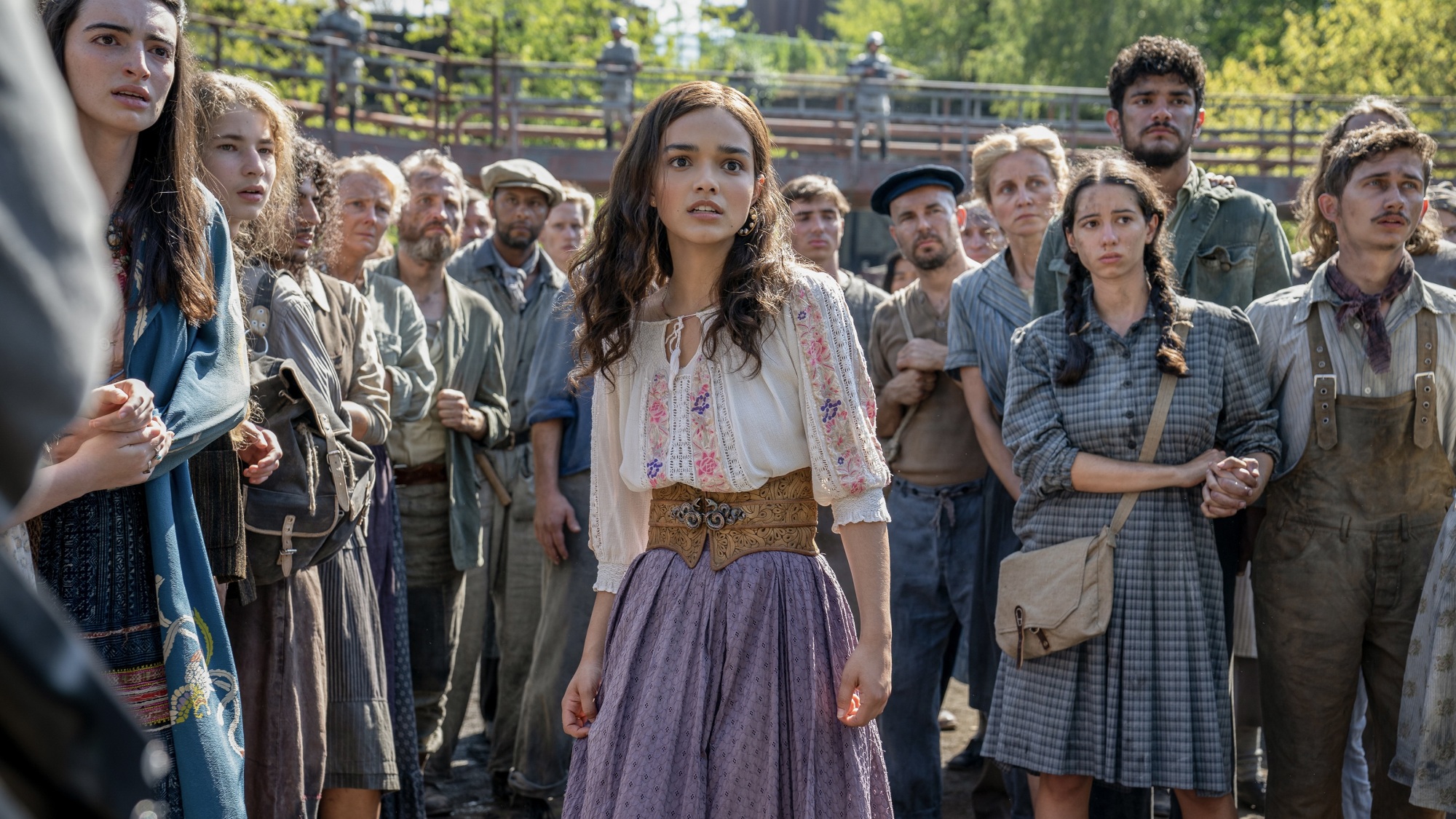
Rachel Zegler in ‚ÄúThe Hunger Games: The Ballad of Songbirds and Snakes.‚ÄĚ
Credit: Murray Close
The Ballad of Songbirds and Snakes centers on young Coriolanus Snow (Tom Blyth), who will one day become the president of Panem. Yet the Coriolanus we meet here is not that scheming, murderous dictator tending to roses in his presidential mansion, but rather a student desperate to return his impoverished family to their former glory.
Like much of the Capitol, the Snows were completely decimated by war with the Districts. Coriolanus and his cousin Tigris (Hunter Schafer) do their greatest to keep up appearances in high society, but their resources are running thin. Their only hope is if Coriolanus secures the top spot in his class at the Academy, giving him the coveted Plinth prize.
‚ÄėThe Hunger Games: The Ballad of Songbirds and Snakes‚Äô trailer takes us back to the arena
However, this year‚Äôs Plinth prize will be determined based on a new test: Which Academy student can be the greatest mentor to a tribute of the 10th annual Hunger Games? That‚Äôs right ‚ÄĒ 64 years before Katniss Everdeen and Peeta Mellark faced death in the arena, President Snow found his own fate tied directly to the Games.
Coriolanus is assigned Lucy Gray Baird (Rachel Zegler), one of the tributes from District 12. Don’t expect her to be anything like Katniss, though. Lucy Gray is a natural performer, one who can break and win hearts with just one song. Unfortunately, those skills may not translate to the brutality of the arena. Coriolanus and Lucy Gray will have to come up with a new strategy if they want to come out on top.
The Ballad of Songbirds and Snakes gives us the Hunger Games like you’ve never seen them before.
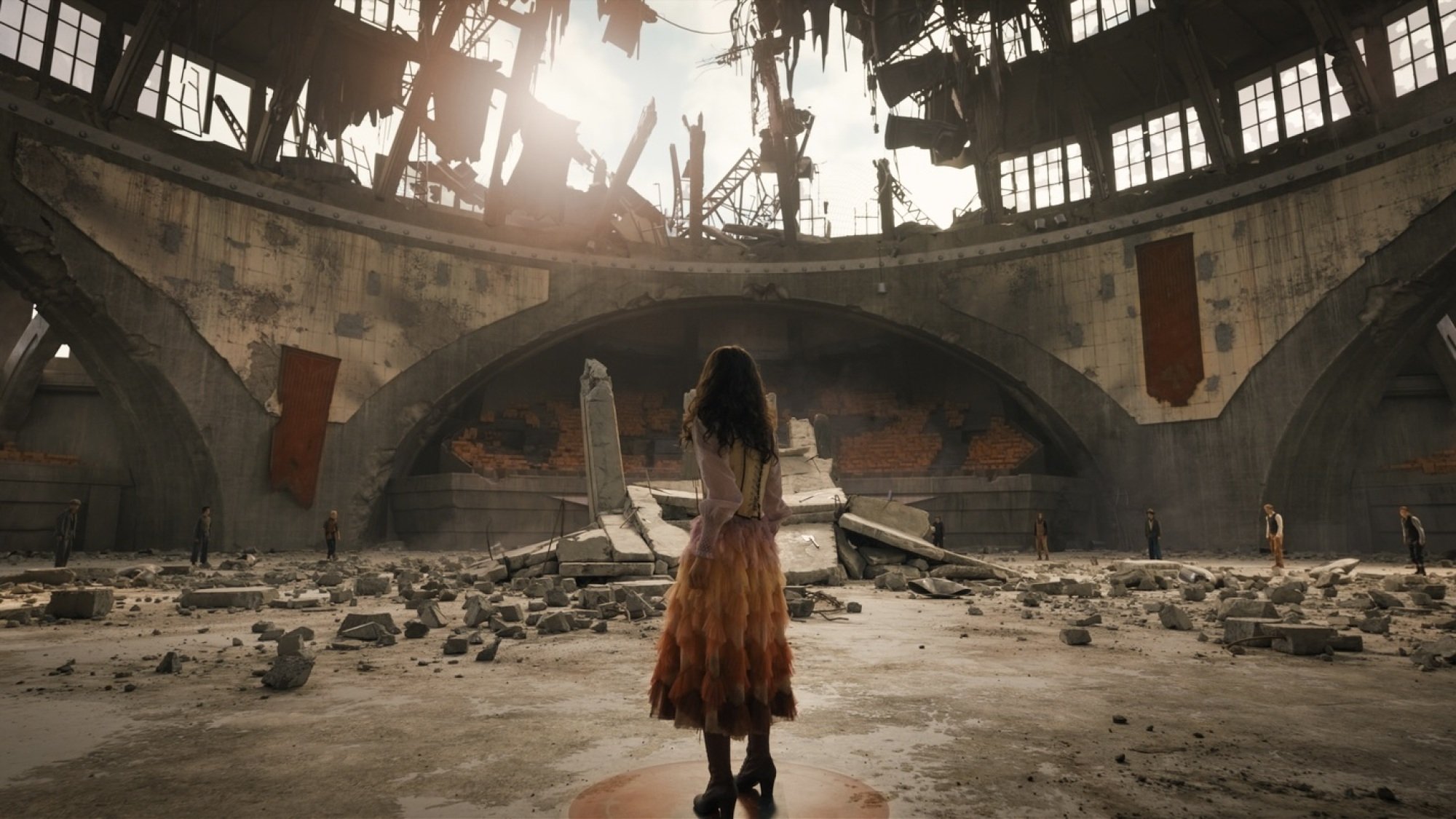
Rachel Zegler in ‚ÄúThe Hunger Games: The Ballad of Songbirds and Snakes.‚ÄĚ
Credit: Courtesy of Lionsgate
The Hunger Games that Coriolanus and Lucy Gray find themselves facing are a totally different beast from those in the first series of films. Here, they‚Äôre held in the same ramshackle sports arena every year. Tributes are kept in a zoo enclosure instead of paraded before the Capitol in District-specific couture. Up until this particular year, there are no mentors, no pomp and circumstance, and ‚ÄĒ crucially ‚ÄĒ very few viewers. As it turns out, making children fight to the death is not initially a popular idea. But if you‚Äôve seen The Hunger Games, you know that in a matter of decades, these will be the Capitol‚Äôs favorite spectacle.
The journey that the Hunger Games go on to become the high-tech extravaganza Katniss eventually volunteers for is one of this movie’s most compelling angles. How do you convince, and even incentivize, people to watch such horrors? And how does Coriolanus become instrumental in this process? Hunger Games fans will recognize the seeds being planted for future aspects of the Games (like sponsors and interviews) throughout The Ballad of Songbirds and Snakes. But while these elements will tickle your nostalgia bone, they’ll also evoke a sense of creeping dread. We’re watching the birth and gamification of a terrifying propaganda machine in real time.
This earlier time period also provides director Francis Lawrence (who helmed Catching Fire and both Mockingjay films) with ample opportunities to set The Ballad of Songbirds and Snakes apart from the rest of The Hunger Games. The stripped-back nature of these games allows for more visceral sequences of survival, along with a grimier, grittier aesthetic that matches that of the mostly ruined Capitol. We also get the extra perspective of Coriolanus watching Lucy Gray in the arena from a distance, a vantage point that gives us new insight into how the Games work behind the scenes, even in these earlier stages.
Coriolanus Snow makes a fascinating protagonist for The Ballad of Songbirds and Snakes.
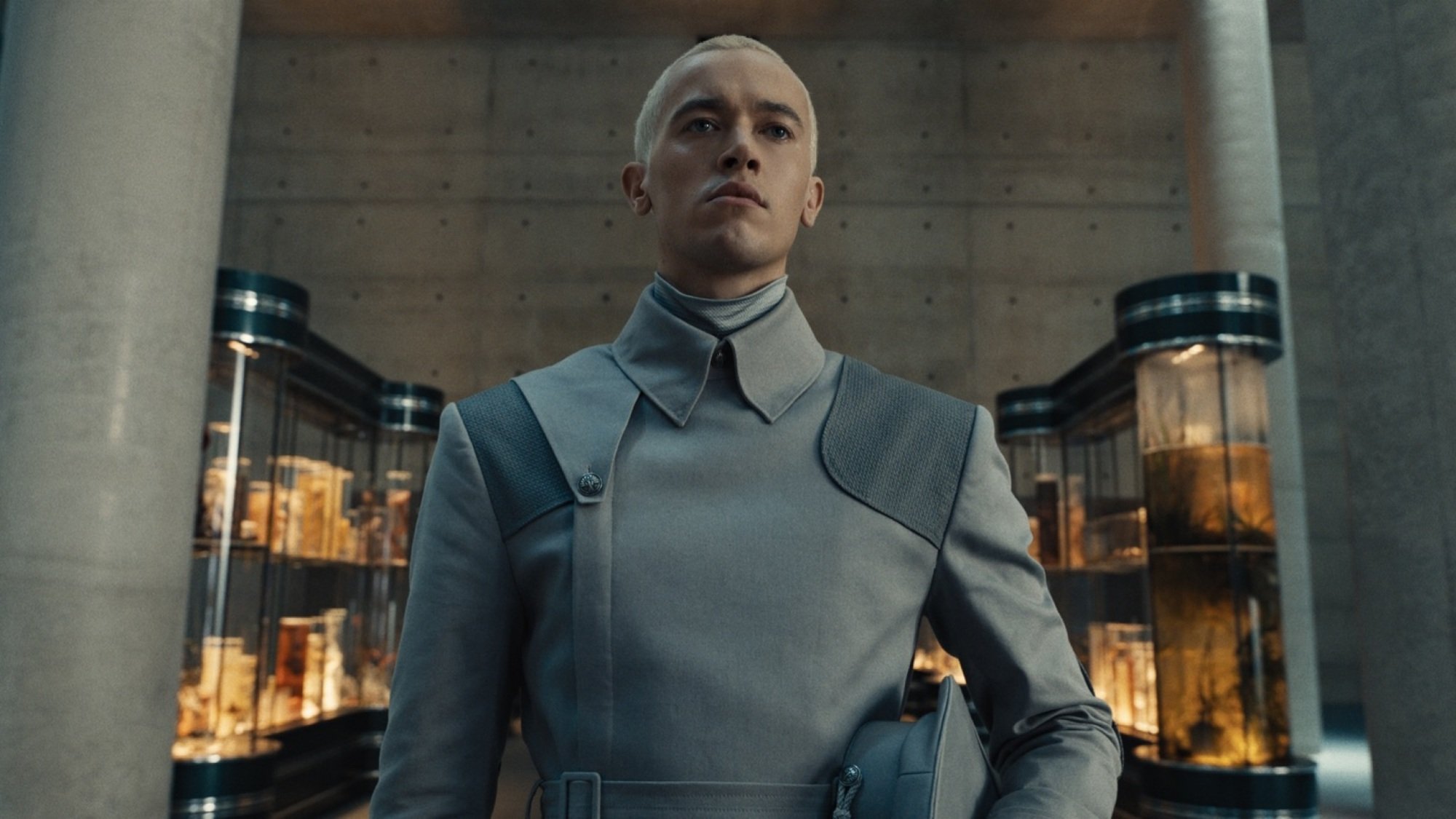
Tom Blyth in ‚ÄúThe Hunger Games: The Ballad of Songbirds and Snakes.‚ÄĚ
Credit: Courtesy of Lionsgate
Unlike The Hunger Games, which takes place from Katniss‚Äôs perspective, The Ballad of Songbirds and Snakes puts us in Coriolanus‚Äôs shoes. We know the kind of monster he‚Äôll be as president, yet the film doesn‚Äôt condemn his past self. Instead, it presents us with a character who faces choice after choice that will determine the kind of person he will become. These choices are never as simple as ‚Äúgood versus evil‚ÄĚ ‚ÄĒ really, every character is a varying combination of the two ‚ÄĒ but slowly and surely, they‚Äôll take us in the direction of the Snow we‚Äôre more familiar with.
That’s not to say The Ballad of Songbirds and Snakes doesn’t ask us to empathize with or even root for Coriolanus. His family’s plight makes him an underdog in his own right, at least by Capitol standards. Loving interactions between him, Tigris, and Grandma’am (Fionnula Flanagan) establish the ties that bind him to the people he’s fighting for. Hilariously, his introductory scene sees him shirtless, a winking nod to the trope of the sympathetic teen heartthrob.
Yet The Ballad of Songbirds and Snakes also reveals future President Snow’s more conniving personality traits. Coriolanus is snobby to a fault, showing disdain for the Districts and for District-born Capitol citizens like his classmate Sejanus Plinth (Josh Andrés Rivera). And while he wants to help Lucy Gray win the Hunger Games, how much of that desire is self-serving as opposed to a selfless wish to keep her alive?
With questions like these, The Ballad of Songbirds and Snakes plays with your allegiance to Coriolanus throughout the film. Sometimes I found myself wincing at the realization that I had wanted him to succeed, hoping he could change for the better despite knowing what his future holds. Much of this comes down to Blyth’s performance, as he capably balances the vulnerability inherent in Coriolanus’s allegiance to his family with more sinister prejudices. The tug of war between the two is always present, but especially so in the film’s third act. Unfortunately, that act also gets the least amount of time to breathe, leading to a rushed conclusion that undermines some of his key character development and Blyth’s fine character work.
From Rachel Zegler to Viola Davis, The Ballad of Songbirds and Snakes sings with great performances.
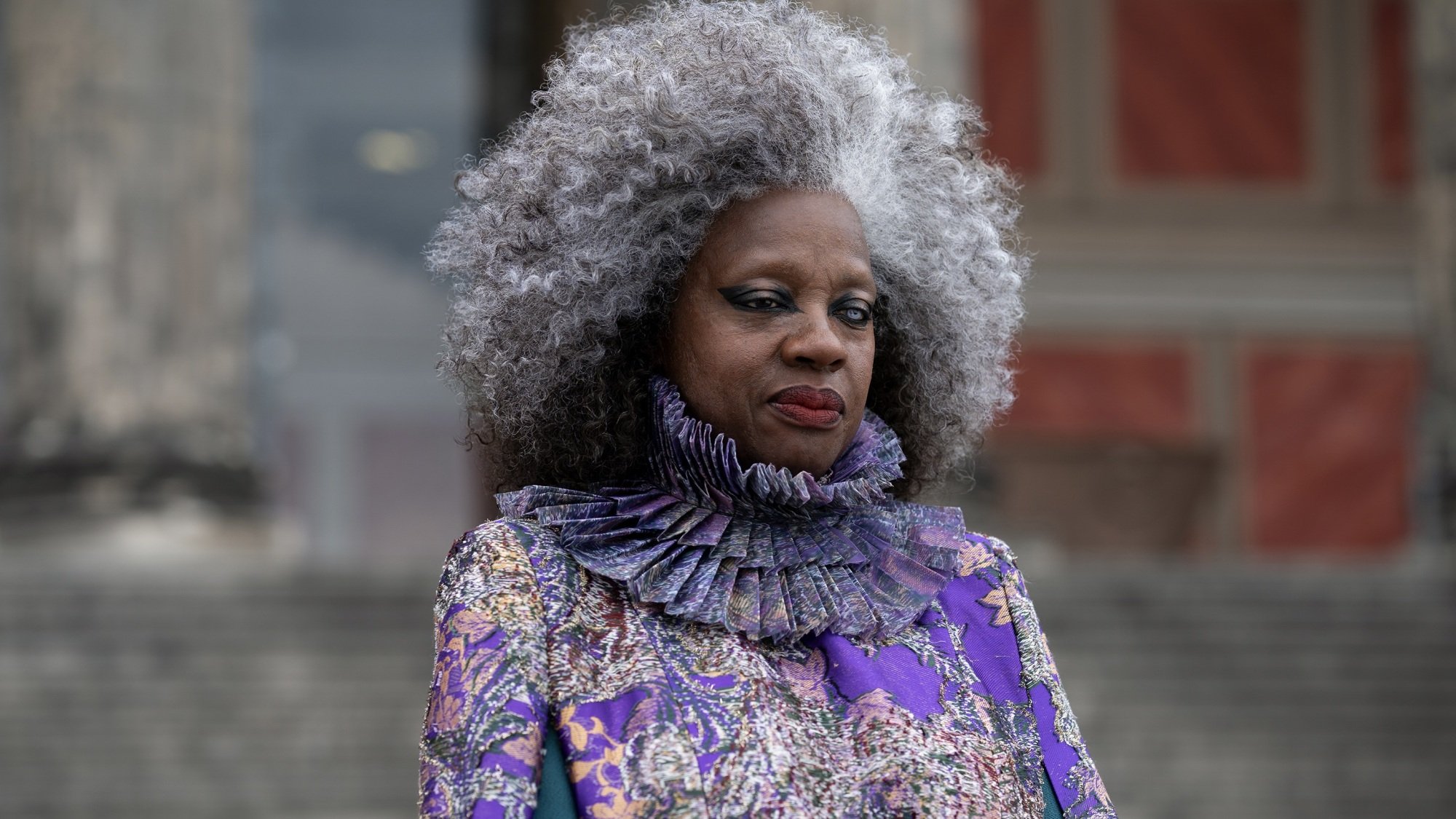
Viola Davis in ‚ÄúThe Hunger Games: The Ballad of Songbirds and Snakes.‚ÄĚ
Credit: Murray Close
With his commanding performance, Blyth anchors the film‚Äôs excellent cast. Zegler is outstanding as Lucy Gray, taking the role of District 12 tribute ‚ÄĒ which, let‚Äôs face it, comes with a lot of baggage ‚ÄĒ and making it her own. Plus, there‚Äôs no beating her gorgeous voice, which brings District 12 songs like ‚ÄúThe Hanging Tree‚ÄĚ to vibrant, folksy life.
Elsewhere, Rivera and Schafer serve as two of the film’s most defined moral compasses. Rivera’s Sejanus struggles with the tension of being District-born yet rich enough for his family to excel in the Capitol. His eventual dissidence is both inspiring and heartbreaking: He’s a revolutionary before his time. As Tigris, Schafer brings out a sweeter, softer side of the Snow family, even if she’s woefully underused. Truly, she lights up every scene she’s in.
Rounding out the cast are a trio of more seasoned performers as staples in the Capitol community. Jason Schwartzman plays Lucky Flickerman, first-ever host of the Hunger Games (and amateur magician). His stressed presentation of the Games and various pratfalls serve as a lighter counterbalance to the film’s darker material. Is this the funniest Hunger Games film thanks to him? Why, yes, yes it is.
Joining Schwartzman in the ‚Äúexceedingly fun to watch‚ÄĚ category is Viola Davis as Dr. Volumnia Gaul, Head Gamemaker. Whether she‚Äôs handling poisonous rainbow snakes or exploring the real purpose of the Games, Davis chews the scenery with villainous pleasure. Her love of the Games is balanced by Peter Dinklage‚Äôs Casca Highbottom, Dean of the Academy and creator of the Games. Where Davis is gleeful, Dinklage is somber, bearing the weight of the Games on his perpetually sunken shoulders.
The tension between Gaul and Highbottom may not be the central relationship of The Ballad of Songbirds and Snakes, but it does get at the film’s central themes. The former wants to increase the visibility of the Games, while the latter wishes they would end entirely. The Games’ declining viewership puts their future at a crossroad; either Gaul or Highbottom’s ideologies could win out. And while we know which one does eventually win, that doesn’t make the ride any less enjoyable or intriguing. The Ballad of Songbirds and Snakes is captivating through and through, capturing the magic that made The Hunger Games such a sensation while delivering a darker, more nuanced look at the corruption at the heart of Panem.
The Ballad of Songbirds and Snakes opens in theaters on Nov. 17.
-

 Business5 days ago
Business5 days agoWeWork, once valued at $47 billion, files for bankruptcy
-

 Entertainment5 days ago
Entertainment5 days agoiPhone 15 Pro Max vs. Pixel 8 Pro camera comparison: the results shocked me
-

 Business5 days ago
Business5 days agoIn Mamaearth, Peak XV finds its fourth 10x return since Sequoia separation
-

 Business3 days ago
Business3 days agoPrime members can now get a One Medical membership for $9/month
-

 Business4 days ago
Business4 days agoNintendo confirms live-action Zelda movie is in the works
-

 Business6 days ago
Business6 days agoThe circular economy promises to remake retail. Why is it so hard to trust?
-

 Business5 days ago
Business5 days agoGenerative AI shouldn’t reduce your startup’s marketing headcount
-

 Business3 days ago
Business3 days agoBob Iger says Disney would like to stay in India amid Hotstar’s subscriber dip

























